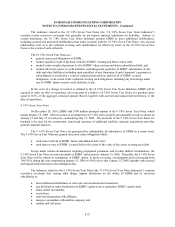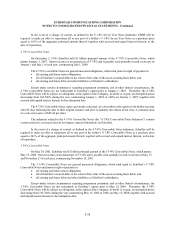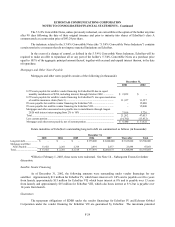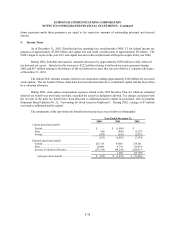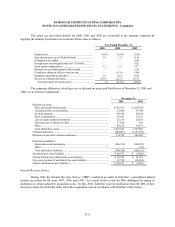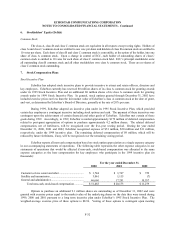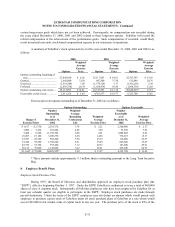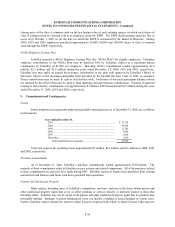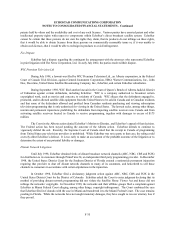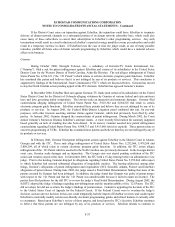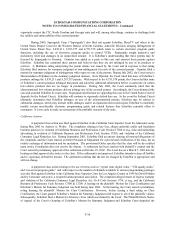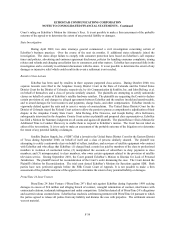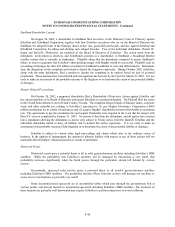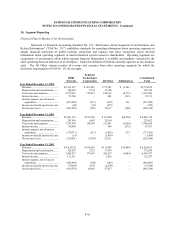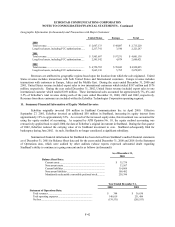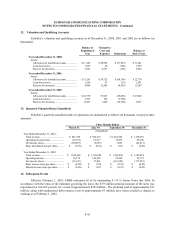Dish Network 2002 Annual Report Download - page 97
Download and view the complete annual report
Please find page 97 of the 2002 Dish Network annual report below. You can navigate through the pages in the report by either clicking on the pages listed below, or by using the keyword search tool below to find specific information within the annual report.ECHOSTAR COMMUNICATIONS CORPORATION
NOTES TO CONSOLIDATED FINANCIAL STATEMENTS - Continued
F-37
If the District Court enters an injunction against EchoStar, the injunction could force EchoStar to terminate
delivery of distant network channels to a substantial portion of its distant network subscriber base, which could also
cause many of these subscribers to cancel their subscription to EchoStar’s other programming services. Any such
terminations would result in a small reduction in EchoStar’s reported average monthly revenue per subscriber and could
result in a temporary increase in churn. If EchoStar loses the case at trial, the judge could, as one of many possible
remedies, prohibit all future sales of distant network programming by EchoStar, which would have a material adverse
affect on its business.
Gemstar
During October 2000, Starsight Telecast, Inc., a subsidiary of Gemstar-TV Guide International, Inc.
(“Gemstar”), filed a suit for patent infringement against EchoStar and certain of its subsidiaries in the United States
District Court for the Western District of North Carolina, Asheville Division. The suit alleges infringement of United
States Patent No. 4,706,121 (“the `121 Patent”) which relates to certain electronic program guide functions. EchoStar
has examined this patent and believes that it is not infringed by any of its products or services. This conclusion is
supported by findings of the International Trade Commission (“ITC”) which are discussed below. Gemstar has moved
to stay the North Carolina action pending appeal of the ITC decision. EchoStar has opposed Gemstar’s motion.
In December 2000, EchoStar filed suit against Gemstar-TV Guide (and certain of its subsidiaries) in the United
States District Court for the District of Colorado alleging violations by Gemstar of various federal and state anti-trust
laws and laws governing unfair competition. The lawsuit seeks an injunction and monetary damages. Gemstar filed
counterclaims alleging infringement of United States Patent Nos. 5,923,362 and 5,684,525 that relate to certain
electronic program guide functions. EchoStar examined these patents and believe they are not infringed by any of its
products or services. In August 2001, the Federal Multi-District Litigation panel combined this suit, for pre-trial
purposes, with other lawsuits asserting antitrust claims against Gemstar, which had previously been filed by other
parties. In January 2002, Gemstar dropped the counterclaims of patent infringement. During March 2002, the Court
denied Gemstar’s Motion to Dismiss EchoStar’s antitrust claims. A more recently filed motion for summary judgment
based generally on lack of standing has also been denied. In its answer, Gemstar asserted new patent infringement
counterclaims regarding United States Patent Nos. 4,908,713 and 5,915,068 (which is expired). These patents relate to
onscreen programming of VCRs. EchoStar has examined these patents and believes that they are not infringed by any of
its products or services.
In February 2001, Gemstar filed patent infringement actions against EchoStar in the District Court in Atlanta,
Georgia and with the ITC. These suits allege infringement of United States Patent Nos. 5,252,066, 5,479,268 and
5,809,204, all of which relate to certain electronic program guide functions. In addition, the ITC action alleges
infringement of the `121 Patent which is asserted in the North Carolina case previously discussed. In the Georgia district
court case, Gemstar seeks damages and an injunction. The Georgia case was stayed pending resolution of the ITC
action and remains stayed at this time. In December 2001, the ITC held a 15-day hearing before an administrative law
judge. Prior to the hearing, Gemstar dropped its allegations regarding United States Patent No. 5,252,066 with respect
to which EchoStar had asserted substantial allegations of inequitable conduct. The hearing addressed, among other
things, Gemstar’s allegations of patent infringement and respondents’ (SCI, Scientific Atlanta, Pioneer and EchoStar)
allegations of patent misuse. During June 2002, the judge issued a Final Initial Determination finding that none of the
patents asserted by Gemstar had been infringed. In addition, the judge found that Gemstar was guilty of patent misuse
with respect to the `121 Patent and that the `121 Patent was unenforceable because it failed to name an inventor. The
parties then filed petitions for the full ITC to review the judge’s Final Initial Determination. During August 2002, the
full ITC adopted the Judge’s findings regarding non-infringement and the unenforceability of the `121 Patent. The ITC
did not adopt, but did not overturn, the Judge’s findings of patent misuse. Gemstar is appealing the decision of the ITC
to the United States Court of Appeals for the Federal Circuit. If the Federal Circuit were to overturn the Judge’s
decision, such an adverse decision in this case could temporarily halt the import of EchoStar receivers and could require
EchoStar to materially modify certain user-friendly electronic programming guides and related features it currently offer
to consumers. Based upon EchoStar’s review of these patents, and based upon the ITC’s decision, EchoStar continues
to believe that these patents are not infringed by any of its products or services. EchoStar intends to continue to


